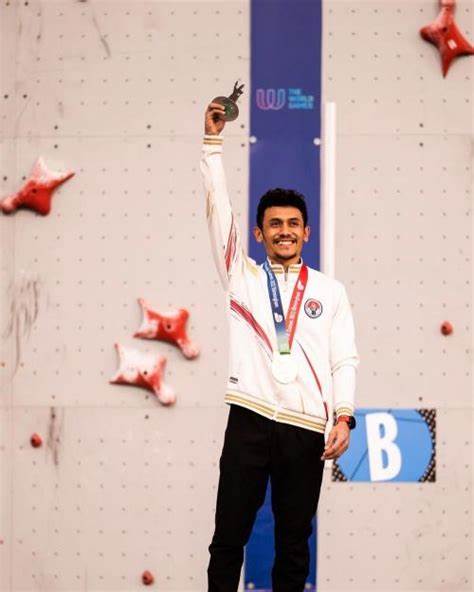
Veddriq Leonardo of Indonesia made history at the Paris 2024 Olympics by winning the inaugural gold medal in men’s speed climbing. The event saw thrilling performances, including a world-record-breaking climb by USA’s Sam Watson, who secured the bronze medal.
The men’s speed climbing event was highly anticipated, following the success of Poland’s Aleksandra Mirosław, who claimed the gold in the women’s competition a day earlier. Leonardo’s victory marked Indonesia’s first gold medal at Paris 2024, and he expressed immense joy and pride, saying, “This was always my dream, and today I made my dream come true. All of Indonesia is happy with this gold medal.”
The event format, which separated speed climbing from the boulder and lead events, allowed speed specialists to shine. Eight climbers competed in the elimination rounds, with Watson setting the pace by defeating Julian David with a time of 5.03 seconds. In a nail-biting quarter-final, world number two Wu Peng narrowly edged out reigning world champion Matteo Zurloni by just 0.002 seconds.
Leonardo demonstrated his prowess in the quarterfinals by clocking the fastest time of 4.88 seconds, eliminating France’s Bassa Mawem, who announced his retirement after the competition. Meanwhile, Reza Alipour secured his spot in the semi-finals with a strong performance against Amir Maimuratov.
The semi-final matchups were intense. Watson faced Wu in a tightly contested race. Despite a promising start, Watson stumbled slightly, allowing Wu to advance to the final with a time of 4.85 seconds, compared to Watson’s 4.93. In the other semi-final, Leonardo set a personal best of 4.78 seconds, defeating Alipour, who finished in 4.84 seconds.
The battle for the bronze was a highlight, with Watson overcoming his semi-final disappointment to set a new world record of 4.74 seconds, surpassing his previous record set just days earlier. He beat Alipour, demonstrating the rapid evolution and competitive spirit in speed climbing.
The final was a fitting climax to the event, showcasing the quickest race of the finals. Leonardo narrowly defeated Wu, clocking in at 4.75 seconds, just 0.02 seconds ahead of Wu’s 4.77. This victory not only earned Leonardo a gold medal but also established him as the first Indonesian to top the podium at the Paris 2024 Olympics.
The event underscored the excitement and growing popularity of speed climbing, highlighting the incredible athleticism and determination of the climbers. With Leonardo’s victory and Watson’s record-breaking performance, the competition set a high standard for future Olympic speed climbing events.
Sport climbing, a thrilling and dynamic event, has become a prominent part of the Olympic Games, offering a showcase of speed, agility, strategy, and strength. This event, which first appeared at the Youth Olympic Games in Buenos Aires in 2018 and made its full Olympic debut at the Tokyo 2020 Games, is divided into three distinct disciplines: bouldering, speed, and lead climbing.
Bouldering
In bouldering, athletes tackle a nearly 5-meter wall without ropes, aiming to complete a series of four “problems” or climbing routes with as few attempts as possible. The climbers have a limited amount of time to navigate these challenges—five minutes in the semifinals and four minutes in the finals, with an eight-minute observation period before the final climb. The focus is on problem-solving skills and physical prowess, as competitors earn points for reaching scoring holds and completing each problem, with a maximum of 25 points available per problem.
Speed Climbing
Speed climbing is a race against the clock in a head-to-head format. Climbers scale a standardized 15-meter wall, and the competition begins with a “seeding” round where each of the 14 athletes completes two runs on different sides of the wall. These times determine their rankings for the elimination heats, which follow a knockout format. The top performers advance through quarterfinals, semifinals, and the final round. In this fast-paced discipline, top athletes can reach the summit in as little as seven seconds. Climbers can study the wall beforehand to strategize their ascent, making it a blend of quick thinking and rapid execution.
Lead Climbing
Lead climbing tests endurance and technique as athletes aim to climb as high as possible on a 15-meter wall within six minutes. The routes are unknown to the competitors beforehand, adding an element of surprise and strategy. The higher a climber ascends, the more points they earn, with a perfect climb to the top worth 100 points. This discipline requires careful planning, strength, and stamina to navigate the complex routes.
History and Popularity
The origins of competitive sport climbing date back to 1985, with the first organized competition, “SportRoccia,” held near Turin, Italy. The sport’s rapid growth led to its inclusion in the Olympic program, reflecting its increasing global popularity. Sport climbing attracts a young and diverse audience, with nearly 40% of climbers under 18 and participation spanning 150 countries.
Scoring and Olympic Format
During the Tokyo Games, athletes competed in all three disciplines, with their final scores derived from a combination of results. The climber with the lowest total score claimed the gold medal. However, for the Paris 2024 Games, the format was adjusted, awarding separate medals for the combined bouldering and lead events and for speed climbing.
Paris 2024 Highlights
At the 2024 Paris Olympics, the sport climbing competition began on August 5, with boulder and speed seeding heats. In the speed climbing final, Polish climber Aleksandra Mirosław captured gold, while her compatriot Aleksandra Kalucka took bronze, and China’s Lijuan Deng earned silver. American speed climber Emily Hunt, despite not advancing past the quarterfinals, maintained a positive outlook, showcasing the spirit and resilience inherent in the sport.
Sport climbing’s Olympic presence underscores its exhilarating appeal and the dedication of its athletes, who continuously push the boundaries of physical and mental limits.
Olympic sport climbing is an exhilarating event that combines speed, strength, strategy, and agility. This dynamic sport, which became an official Olympic event at the Tokyo 2020 Games, is divided into three distinct disciplines: bouldering, speed, and lead climbing. Each discipline challenges athletes in unique ways, showcasing their versatility and athleticism.
Speed Climbing is particularly thrilling as it involves a head-to-head race to the top of a standardized 15-meter wall. The objective is simple yet demanding: scale the wall as fast as possible. The world of sport climbing recently witnessed a remarkable feat when an American teenager set a new record by climbing this wall in under five seconds. This astonishing achievement highlights the incredible speed and precision required in this discipline. Climbers must make split-second decisions and execute flawless techniques to minimize their time while maintaining safety.
In Bouldering, athletes tackle a shorter wall of around 5 meters without ropes, focusing on problem-solving and technique. They must complete a series of challenging routes, known as “problems,” within a limited time, using as few attempts as possible. The emphasis is on creativity and strength as climbers maneuver through complex holds and sequences.
Lead Climbing tests endurance and planning as athletes ascend a 15-meter wall, aiming to climb as high as possible within a set time. Unlike bouldering, climbers are secured with ropes, and the route is unknown to them until the competition, requiring them to strategize on the spot.
The inclusion of sport climbing in the Olympics reflects its growing global popularity and appeal, especially among younger audiences. With nearly 40% of climbers under 18, the sport continues to attract a diverse range of participants, inspired by the physical and mental challenges it presents. The Olympic stage provides a perfect platform for showcasing the talents of these exceptional athletes and their remarkable achievements.
